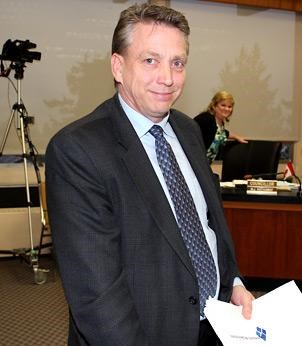How much of a tax increase residents will shoulder this year depends on whether their property assessments increased or decreased.
Dave Douglas, City of Powell River’s director of financial services, presented an overview of the 2013-2017 financial plan during the April 18 council meeting.
The 2013 budget has a 3.8 per cent tax increase to the residential and business tax classes, as well as a three per cent increase to fees and charges in the sewer and water operating funds. Major industrial taxation is $2.25 million, the same as it has been since 2011.
“Generally, within the municipality, assessments went down,” Douglas said. “Some properties went up, but most went down.”
Douglas provided a series of sample tax bills from a range of homes, which he has been following over a number of years. The first property was assessed at $140,900 in 2012 and at $133,700 in 2013. The total municipal tax bill was $1,819.33 in 2012 and increased by two per cent in 2013 to $1,857.27.
The assessment value of the second property increased, however. It went from $259,100 in 2012 to $260,700. The total municipal tax bill increased by 6.5 per cent, from $2,392 in 2012 to $2,547 in 2013.
Douglas included two sample business properties as well. One saw its assessment increase from $119,100 in 2012 to $177,300 in 2013. In 2012, total municipal taxes were $4,215. The bill increased by 31 per cent in 2013 to $5,524.
Addressing the 2013 budget, Douglas explained that expenses are increasing, while revenues are down.
“We have had some significant budget reductions, more on the revenue side than on the expense side, but we did do some work on the expense side,” Douglas said. For example, revenues from the small community grant, ticket fines, south harbour and Willingdon Beach campsite are down. Increased expenses include $47,000 for an information technology staff position, $70,000 for the RCMP and $45,000 for fire and emergency services.
In the general operating fund, about $5 million in capital projects is planned, as well as about $1 million in capital from the sewer fund and $940,138 in the water fund.
About 15 people attended the budget presentation and asked a range of questions after Douglas’s presentation. A number of the people in the audience were city workers who belong to CUPE (Canadian Union of Public Employees) Local 798. Questions included the cost of creating a new management position, director of infrastructure and why the city was hiring a consultant for union contract negotiations.
Mayor Dave Formosa explained that in the past, senior management led negotiations for the city, but this year council is contemplating hiring a negotiator, so $20,000 was included in the budget. The new management position involved changes to the engineering and public works department, with $130,000 in the budget for the restructuring.
Other questions were about the $57,000 for the mayor’s task force on economic revitalization. Formosa explained that $27,000 of that is earmarked for PRREDS (Powell River Regional Economic Development Society) for its business retention and expansion project. The remainder of the funds will be used to implement the plan the committee will present to council by the end of August.
Another topic of discussion was the city’s flat tax, a per parcel fee levied on each property. Nyla Ross, a city employee, pointed out the British Columbia Property Tax Deferment Program allows property owners to defer taxes on their principle residences. She questioned why the city continues to use it because it seems “unjust.”
Councillor Chris McNaughton pointed out that the impact on higher-end and mid-priced homes would be “quite dramatic” if the flat tax was eliminated. “In a struggling economy, it maybe isn’t the most prudent thing to adjust so dramatically,” he said. “There’s an argument from some that it’s not appropriate and from others that it is, so council is taking an approach of a gradual reduction to the flat tax.”
The city is reducing the flat tax by five per cent a year.



